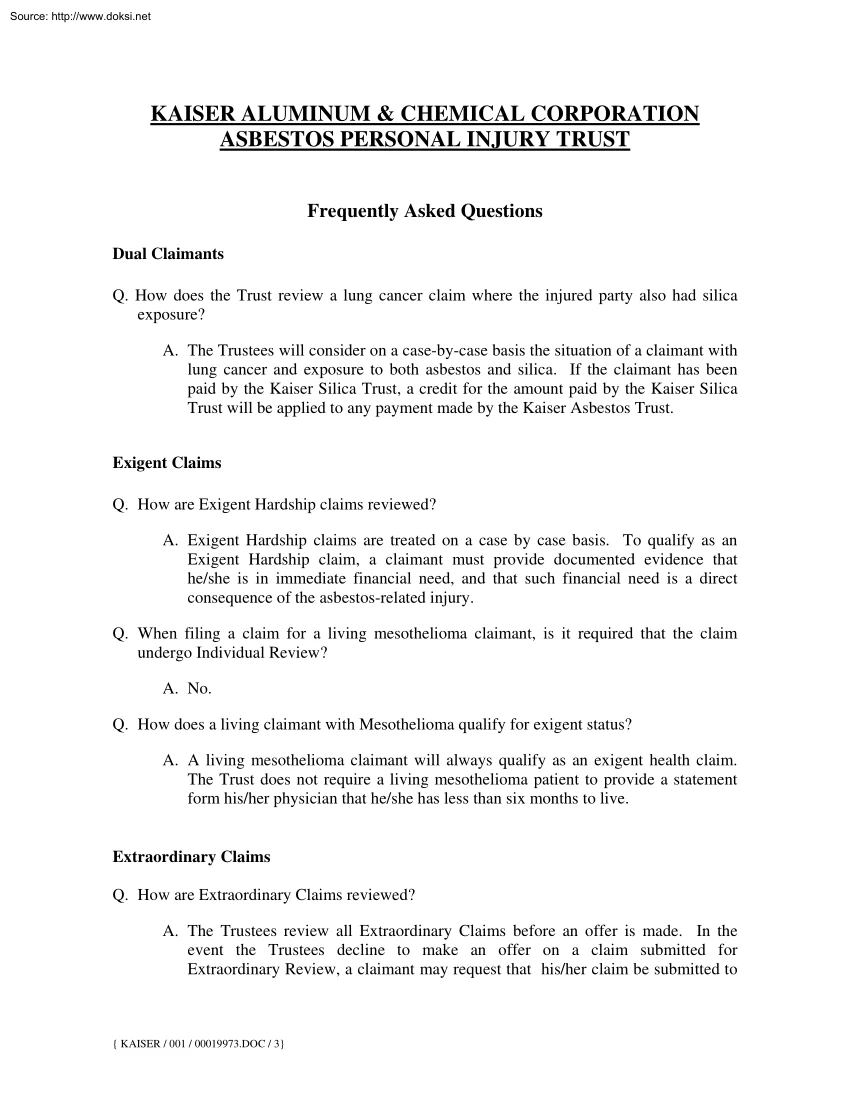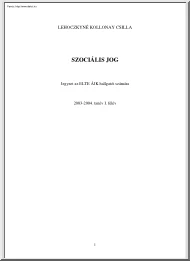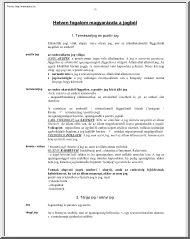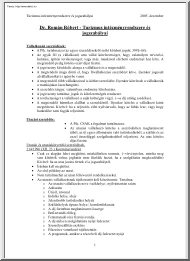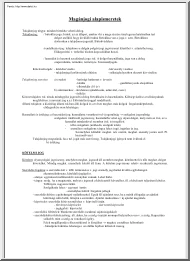Datasheet
Year, pagecount:2010, 6 page(s)
Language:English
Downloads:2
Uploaded:May 09, 2019
Size:474 KB
Institution:
-
Comments:
Attachment:-
Download in PDF:Please log in!
Comments
No comments yet. You can be the first!Most popular documents in this category
Content extract
Source: http://www.doksinet KAISER ALUMINUM & CHEMICAL CORPORATION ASBESTOS PERSONAL INJURY TRUST Frequently Asked Questions Dual Claimants Q. How does the Trust review a lung cancer claim where the injured party also had silica exposure? A. The Trustees will consider on a case-by-case basis the situation of a claimant with lung cancer and exposure to both asbestos and silica. If the claimant has been paid by the Kaiser Silica Trust, a credit for the amount paid by the Kaiser Silica Trust will be applied to any payment made by the Kaiser Asbestos Trust. Exigent Claims Q. How are Exigent Hardship claims reviewed? A. Exigent Hardship claims are treated on a case by case basis To qualify as an Exigent Hardship claim, a claimant must provide documented evidence that he/she is in immediate financial need, and that such financial need is a direct consequence of the asbestos-related injury. Q. When filing a claim for a living mesothelioma claimant, is it required that the claim undergo
Individual Review? A. No Q. How does a living claimant with Mesothelioma qualify for exigent status? A. A living mesothelioma claimant will always qualify as an exigent health claim The Trust does not require a living mesothelioma patient to provide a statement form his/her physician that he/she has less than six months to live. Extraordinary Claims Q. How are Extraordinary Claims reviewed? A. The Trustees review all Extraordinary Claims before an offer is made In the event the Trustees decline to make an offer on a claim submitted for Extraordinary Review, a claimant may request that his/her claim be submitted to { KAISER / 001 / 00019973.DOC / 3} Source: http://www.doksinet the Extraordinary Claims Panel for an independent determination of eligibility for Extraordinary status. Exposure Evidence Q. What evidence is acceptable to establish proof of exposure? A. The signed claim form or electronic filing will be sufficient to establish the claimant’s presence at a work site.
However, the claim form or electronic filing will only be sufficient to establish exposure to a Kaiser product if the work site is on the approved site list. To establish exposure to a Kaiser product at sites not included on the approved site list, the claimant will need to submit either (i) a credible affidavit or sworn statement of the injured party; or (ii) a credible affidavit or sworn statement of a family member or co-worker of the claimant, establishing the presence of a Kaiser product at the site during the period in which the claimant was present at the site; or, (iii) sales or shipping records establishing the use of a Kaiser product at the injured party’s work site before or during the injured party’s presence at the site. Q. Will a claim be immediately denied if a co-worker affidavit is unclear? A. A claim will not be denied immediately if a co-worker affidavit is unclear; Verus will request a more detailed affidavit or other supporting evidence. Q. What is required to
make an addition to the approved site list? A. Documentary evidence is required for any additions to the site list Documentation may consist of such items as sales invoices, shipping records, deposition transcripts, etc. All documentation accompanying a request to add a site to the list will be reviewed by Verus and forwarded to the Trustees with a recommendation. A site will only be added to the site list upon the approval of the Trustees. Q. Who is considered an independent source for additions to the site list? A. An independent, credible source for additions to the site list is someone other than the claimant or his/her family. An independent, credible affidavit from a purchasing agent, contractor, executive, or co-worker may meet this standard. Q. Is “steelworker” an acceptable occupation with presumed SOE? A. Yes, provided the claimant worked in a steel mill in close proximity to the steelmaking process “Steelworker” is on the list of Presumed SOE Occupation and Industry
pairings which is posted on the Trust’s website at www.kaiserasbestostrustcom 2 { KAISER / 001 / 00019973.DOC / 3} Source: http://www.doksinet Q. If a claimant has asbestos exposure on a ship built in the Kaiser Yard #1 or #2 located in Richmond, CA, is the ship treated as a product for purposes of establishing Product ID? A. Yes, Ships built in the Richmond Yards #1 and #2 will be treated as products for purposes of establishing Product ID. A claimant will still need to provide evidence of Significant Occupational Exposure if Significant Occupational Exposure is required for the relevant Disease Level. Q: If the claim does not meet the presumptive exposure criteria for Expedited Review, what options are available? A: If a claim does not meet the exposure requirements of the TDP, the claimant may request Individual Review. Medical Evidence Q. Does the Trust accept grade 3 film ratings as proof of an asbestos-related non-malignant condition? A. The Trust will accept ILO readings on
grade 3 film only if the accompanying narrative from the physician supports the physician’s determination that the film was readable. Q. What doctor specialties are considered acceptable for x-ray readings? A. The Trust will accept x-ray readings from Board certified physicians in radiology, internal medicine, occupational medicine and pulmonary disease. Alternatively, the Trust will accept readings from physicians certified as B-readers by NIOSH (National Institute of Occupational Safety and Health). Please note that the Board certification requirements do not apply to otherwise qualified physicians whose x-rays are submitted for deceased claimants. Q. Are there any circumstances in which a claimant who can only prove an asbestos-related non-malignant condition in one lung may receive compensation? A. Yes The Trust will presume that the non-malignant condition was bilateral in nature in certain unusual situations. For example, if the claimant underwent a pneumonectomy, or is
suffering from a pleural effusion which obscures one lung on an x-ray, the Trust will presume that the diagnosis would have been bilateral. Q. What medical evidence is required to support a diagnosis of mesothelioma? A. For mesothelioma claimants, the Trust will require either (a) a diagnostic report from a board certified pathologist, (b) a pathology report prepared at or on behalf of a JCAHO accredited hospital or clinic or (c) a report from a physician who examined the claimant and diagnosed mesothelioma. Q. What is the meaning of an equivocal diagnosis? 3 { KAISER / 001 / 00019973.DOC / 3} Source: http://www.doksinet A. An equivocal diagnosis is a medical opinion or statement in which the claimant’s physician has specifically cited / named more than one possible disease and has not expressly indicated via exclusion or otherwise that a single disease represents the final diagnosis. If the physician cites / names more than one possible disease, but states that he / she believes
the probable diagnosis is one of the diseases, then Verus is not required to classify the diagnosis as equivocal. If the physician appears unsure of his/her diagnosis and uses expressions like “probably” or “is suggestive of,” but still does not provide a second possible disease, then Verus is not required to classify the diagnosis as equivocal. However, a finding by a physician after July 6, 2006 that a claimant’s disease is “consistent with” or “compatible with” asbestosis shall not alone be treated by the Trust as a diagnosis. Q. If a claimant is unable to provide a copy of the original pathology report to prove a malignant condition, can the claim still be approved? A. If the claimant is able to provide a report from a physician providing a causation report which includes a statement to the effect that the physician has reviewed primary evidence of the disease, the Trust will presume the diagnosis has been established. Q. Will a claim be denied if the medical
evidence is inconsistent? A. A claim will be allowed and paid where the claimant submits inconsistent medical evidence, if there is sufficient evidence to support payment. Q. Is the death certificate acceptable as supporting documentation of medical evidence? A. The Trust can look at the death certificate in conjunction with state law and other documents provided by the claimant, but may not solely rely on the death certificate unless applicable state law provides that a death certificate is presumptive evidence of the cause of death. Offers and Payments Q. How do I rectify a release that is deficient in some way? A. If a release is deficient in some way, the claimant may execute a new release If the claimant is deceased, a release may be executed by the claimant’s personal representative. In the event a release is signed by the claimant’s personal representative, documentation confirming the personal representative’s capacity must also be provided to the Trust if such
documentation is required under applicable state law. Q. How long does a claimant have to respond to an offer? 4 { KAISER / 001 / 00019973.DOC / 3} Source: http://www.doksinet A. Unless court or probate approval of the offer is required or a claim has deferred status, claimants are required to respond to offers within 180 days. Q. Can a claim be upgraded after an offer has been made? A. A claimant can, after an offer has been made, upgrade a claim for good cause, including, without limitation, the discovery of new evidence or the discovery of an error or omission in the initial claim filing. Q. If a claimant files a non-malignancy claim and then acquires knowledge of a malignancy prior to receiving payment from the Trust, can he/she receive payment for both the nonmalignancy and malignancy? A. A claimant, who files a non-malignant claim and then acquires knowledge of a malignancy prior to receiving payment from the Trust, may file a second disease claim. However, the Trust will
deduct the amount of the payment for the nonmalignant claim from any payments made on the second disease claim Q. Are secondary exposure claims paid the Scheduled Value? A. All secondary exposure claims must be submitted for Individual Review, and may receive offers that are less than Scheduled Value. In the case of secondary exposure claims for Disease Levels IV through VIII, such claims may receive offers that are more than the Scheduled Value. Q. Can payment checks be issued sooner than the scheduled payment date? A. The Trust will continue to pay claims once a month The Trustees will consider individual requests for expedited payment on a case-by-case basis. Statute of Limitations Q. What evidence is acceptable to verify a tort claim was filed? A. The signed claim form or electronic filing can serve as verification of the date a tort claim was filed, the jurisdiction in which it was filed and the docket number of the case. The claimant must be able to produce a file-stamped copy of
the complaint upon request of the Trust. Deferred and Deficient Claims Q. Will a claimant be notified if their claim is moved into deferred status? A. Verus will give notice to claimants that their claims are being moved to deferred status if deferment was not requested by claimant or claimant’s counsel. Q. What happens to deficient claims when the Trust adopts new policies? 5 { KAISER / 001 / 00019973.DOC / 3} Source: http://www.doksinet A. Claims will be re-reviewed if the Trust adopts new policies that would allow payment of claims previously denied. If the Trust determines that a new policy is not to be automatically applied retroactively to all claims previously reviewed, the claim will be re-reviewed in accordance with the new policy only if such review is requested. Q: What is the deadline for responding to deficiencies? A: If a claimant does not respond to a deficiency notice for six months, the claim will be automatically deferred for a period of three years, after which
the claim will be withdrawn if no further action is taken by the claimant. Third Party Requests for Information Q. What is the policy regarding releasing personal claimant information to third parties? A. The Trust will not authorize the release of any claimant information unless compelled to do so after issuance of a valid and enforceable subpoena, upon entry of an order from a court of competent jurisdiction, or at the explicit request of the claimant. Deceased Claimants Q. Will the Trust begin processing claims of deceased claimants before the Trust receives final estate documentation? A. The Trust will process claims of deceased claimants and extend an offer prior to receiving final estate documentation. However, the claims of deceased claimants will not be paid until the Trust receives final estate documentation if such documentation is required under applicable state law. Ship Exposure Q. Is the period of required exposure less stringent if the exposure occurs on a ship? A. If
the claimant was confined to an asbestos-containing ship at sea and environmentally exposed to asbestos for 100 days, the Trust will consider the 100 days exposure equivalent to one year. 6 { KAISER / 001 / 00019973.DOC / 3}
Individual Review? A. No Q. How does a living claimant with Mesothelioma qualify for exigent status? A. A living mesothelioma claimant will always qualify as an exigent health claim The Trust does not require a living mesothelioma patient to provide a statement form his/her physician that he/she has less than six months to live. Extraordinary Claims Q. How are Extraordinary Claims reviewed? A. The Trustees review all Extraordinary Claims before an offer is made In the event the Trustees decline to make an offer on a claim submitted for Extraordinary Review, a claimant may request that his/her claim be submitted to { KAISER / 001 / 00019973.DOC / 3} Source: http://www.doksinet the Extraordinary Claims Panel for an independent determination of eligibility for Extraordinary status. Exposure Evidence Q. What evidence is acceptable to establish proof of exposure? A. The signed claim form or electronic filing will be sufficient to establish the claimant’s presence at a work site.
However, the claim form or electronic filing will only be sufficient to establish exposure to a Kaiser product if the work site is on the approved site list. To establish exposure to a Kaiser product at sites not included on the approved site list, the claimant will need to submit either (i) a credible affidavit or sworn statement of the injured party; or (ii) a credible affidavit or sworn statement of a family member or co-worker of the claimant, establishing the presence of a Kaiser product at the site during the period in which the claimant was present at the site; or, (iii) sales or shipping records establishing the use of a Kaiser product at the injured party’s work site before or during the injured party’s presence at the site. Q. Will a claim be immediately denied if a co-worker affidavit is unclear? A. A claim will not be denied immediately if a co-worker affidavit is unclear; Verus will request a more detailed affidavit or other supporting evidence. Q. What is required to
make an addition to the approved site list? A. Documentary evidence is required for any additions to the site list Documentation may consist of such items as sales invoices, shipping records, deposition transcripts, etc. All documentation accompanying a request to add a site to the list will be reviewed by Verus and forwarded to the Trustees with a recommendation. A site will only be added to the site list upon the approval of the Trustees. Q. Who is considered an independent source for additions to the site list? A. An independent, credible source for additions to the site list is someone other than the claimant or his/her family. An independent, credible affidavit from a purchasing agent, contractor, executive, or co-worker may meet this standard. Q. Is “steelworker” an acceptable occupation with presumed SOE? A. Yes, provided the claimant worked in a steel mill in close proximity to the steelmaking process “Steelworker” is on the list of Presumed SOE Occupation and Industry
pairings which is posted on the Trust’s website at www.kaiserasbestostrustcom 2 { KAISER / 001 / 00019973.DOC / 3} Source: http://www.doksinet Q. If a claimant has asbestos exposure on a ship built in the Kaiser Yard #1 or #2 located in Richmond, CA, is the ship treated as a product for purposes of establishing Product ID? A. Yes, Ships built in the Richmond Yards #1 and #2 will be treated as products for purposes of establishing Product ID. A claimant will still need to provide evidence of Significant Occupational Exposure if Significant Occupational Exposure is required for the relevant Disease Level. Q: If the claim does not meet the presumptive exposure criteria for Expedited Review, what options are available? A: If a claim does not meet the exposure requirements of the TDP, the claimant may request Individual Review. Medical Evidence Q. Does the Trust accept grade 3 film ratings as proof of an asbestos-related non-malignant condition? A. The Trust will accept ILO readings on
grade 3 film only if the accompanying narrative from the physician supports the physician’s determination that the film was readable. Q. What doctor specialties are considered acceptable for x-ray readings? A. The Trust will accept x-ray readings from Board certified physicians in radiology, internal medicine, occupational medicine and pulmonary disease. Alternatively, the Trust will accept readings from physicians certified as B-readers by NIOSH (National Institute of Occupational Safety and Health). Please note that the Board certification requirements do not apply to otherwise qualified physicians whose x-rays are submitted for deceased claimants. Q. Are there any circumstances in which a claimant who can only prove an asbestos-related non-malignant condition in one lung may receive compensation? A. Yes The Trust will presume that the non-malignant condition was bilateral in nature in certain unusual situations. For example, if the claimant underwent a pneumonectomy, or is
suffering from a pleural effusion which obscures one lung on an x-ray, the Trust will presume that the diagnosis would have been bilateral. Q. What medical evidence is required to support a diagnosis of mesothelioma? A. For mesothelioma claimants, the Trust will require either (a) a diagnostic report from a board certified pathologist, (b) a pathology report prepared at or on behalf of a JCAHO accredited hospital or clinic or (c) a report from a physician who examined the claimant and diagnosed mesothelioma. Q. What is the meaning of an equivocal diagnosis? 3 { KAISER / 001 / 00019973.DOC / 3} Source: http://www.doksinet A. An equivocal diagnosis is a medical opinion or statement in which the claimant’s physician has specifically cited / named more than one possible disease and has not expressly indicated via exclusion or otherwise that a single disease represents the final diagnosis. If the physician cites / names more than one possible disease, but states that he / she believes
the probable diagnosis is one of the diseases, then Verus is not required to classify the diagnosis as equivocal. If the physician appears unsure of his/her diagnosis and uses expressions like “probably” or “is suggestive of,” but still does not provide a second possible disease, then Verus is not required to classify the diagnosis as equivocal. However, a finding by a physician after July 6, 2006 that a claimant’s disease is “consistent with” or “compatible with” asbestosis shall not alone be treated by the Trust as a diagnosis. Q. If a claimant is unable to provide a copy of the original pathology report to prove a malignant condition, can the claim still be approved? A. If the claimant is able to provide a report from a physician providing a causation report which includes a statement to the effect that the physician has reviewed primary evidence of the disease, the Trust will presume the diagnosis has been established. Q. Will a claim be denied if the medical
evidence is inconsistent? A. A claim will be allowed and paid where the claimant submits inconsistent medical evidence, if there is sufficient evidence to support payment. Q. Is the death certificate acceptable as supporting documentation of medical evidence? A. The Trust can look at the death certificate in conjunction with state law and other documents provided by the claimant, but may not solely rely on the death certificate unless applicable state law provides that a death certificate is presumptive evidence of the cause of death. Offers and Payments Q. How do I rectify a release that is deficient in some way? A. If a release is deficient in some way, the claimant may execute a new release If the claimant is deceased, a release may be executed by the claimant’s personal representative. In the event a release is signed by the claimant’s personal representative, documentation confirming the personal representative’s capacity must also be provided to the Trust if such
documentation is required under applicable state law. Q. How long does a claimant have to respond to an offer? 4 { KAISER / 001 / 00019973.DOC / 3} Source: http://www.doksinet A. Unless court or probate approval of the offer is required or a claim has deferred status, claimants are required to respond to offers within 180 days. Q. Can a claim be upgraded after an offer has been made? A. A claimant can, after an offer has been made, upgrade a claim for good cause, including, without limitation, the discovery of new evidence or the discovery of an error or omission in the initial claim filing. Q. If a claimant files a non-malignancy claim and then acquires knowledge of a malignancy prior to receiving payment from the Trust, can he/she receive payment for both the nonmalignancy and malignancy? A. A claimant, who files a non-malignant claim and then acquires knowledge of a malignancy prior to receiving payment from the Trust, may file a second disease claim. However, the Trust will
deduct the amount of the payment for the nonmalignant claim from any payments made on the second disease claim Q. Are secondary exposure claims paid the Scheduled Value? A. All secondary exposure claims must be submitted for Individual Review, and may receive offers that are less than Scheduled Value. In the case of secondary exposure claims for Disease Levels IV through VIII, such claims may receive offers that are more than the Scheduled Value. Q. Can payment checks be issued sooner than the scheduled payment date? A. The Trust will continue to pay claims once a month The Trustees will consider individual requests for expedited payment on a case-by-case basis. Statute of Limitations Q. What evidence is acceptable to verify a tort claim was filed? A. The signed claim form or electronic filing can serve as verification of the date a tort claim was filed, the jurisdiction in which it was filed and the docket number of the case. The claimant must be able to produce a file-stamped copy of
the complaint upon request of the Trust. Deferred and Deficient Claims Q. Will a claimant be notified if their claim is moved into deferred status? A. Verus will give notice to claimants that their claims are being moved to deferred status if deferment was not requested by claimant or claimant’s counsel. Q. What happens to deficient claims when the Trust adopts new policies? 5 { KAISER / 001 / 00019973.DOC / 3} Source: http://www.doksinet A. Claims will be re-reviewed if the Trust adopts new policies that would allow payment of claims previously denied. If the Trust determines that a new policy is not to be automatically applied retroactively to all claims previously reviewed, the claim will be re-reviewed in accordance with the new policy only if such review is requested. Q: What is the deadline for responding to deficiencies? A: If a claimant does not respond to a deficiency notice for six months, the claim will be automatically deferred for a period of three years, after which
the claim will be withdrawn if no further action is taken by the claimant. Third Party Requests for Information Q. What is the policy regarding releasing personal claimant information to third parties? A. The Trust will not authorize the release of any claimant information unless compelled to do so after issuance of a valid and enforceable subpoena, upon entry of an order from a court of competent jurisdiction, or at the explicit request of the claimant. Deceased Claimants Q. Will the Trust begin processing claims of deceased claimants before the Trust receives final estate documentation? A. The Trust will process claims of deceased claimants and extend an offer prior to receiving final estate documentation. However, the claims of deceased claimants will not be paid until the Trust receives final estate documentation if such documentation is required under applicable state law. Ship Exposure Q. Is the period of required exposure less stringent if the exposure occurs on a ship? A. If
the claimant was confined to an asbestos-containing ship at sea and environmentally exposed to asbestos for 100 days, the Trust will consider the 100 days exposure equivalent to one year. 6 { KAISER / 001 / 00019973.DOC / 3}
